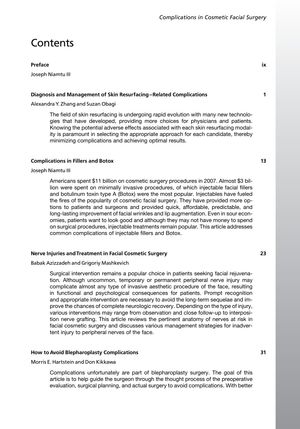Contents
January 2009
in “
Oral and Maxillofacial Surgery Clinics of North America
”

TLDR The document concludes that understanding risks, careful patient selection, precise surgery, quick complication management, and good communication can improve cosmetic facial surgery outcomes.
The document is a compilation of articles discussing various complications associated with cosmetic facial surgery and how to manage or prevent them. Topics include skin resurfacing-related complications, issues with injectable fillers and Botox, nerve injuries in facial cosmetic surgery, avoiding blepharoplasty complications, and complications in neck liposuction, submentoplasty, facelift surgery, rhinoplasty, facial implants, and hair restoration surgery. The articles emphasize the importance of understanding potential adverse effects, proper patient selection, meticulous surgical technique, and prompt recognition and treatment of complications to achieve optimal results and minimize long-term consequences. Additionally, the document touches on the psychological aspect of patient care in oral and maxillofacial surgery by suggesting that surgeons view patients as potential jurors to improve communication and understanding. Specific figures regarding the popularity and financial aspects of cosmetic procedures, such as the $11 billion spent on cosmetic surgery in 2007, are also mentioned. The document aims to provide surgeons with insights and strategies to enhance patient outcomes in cosmetic facial procedures.



